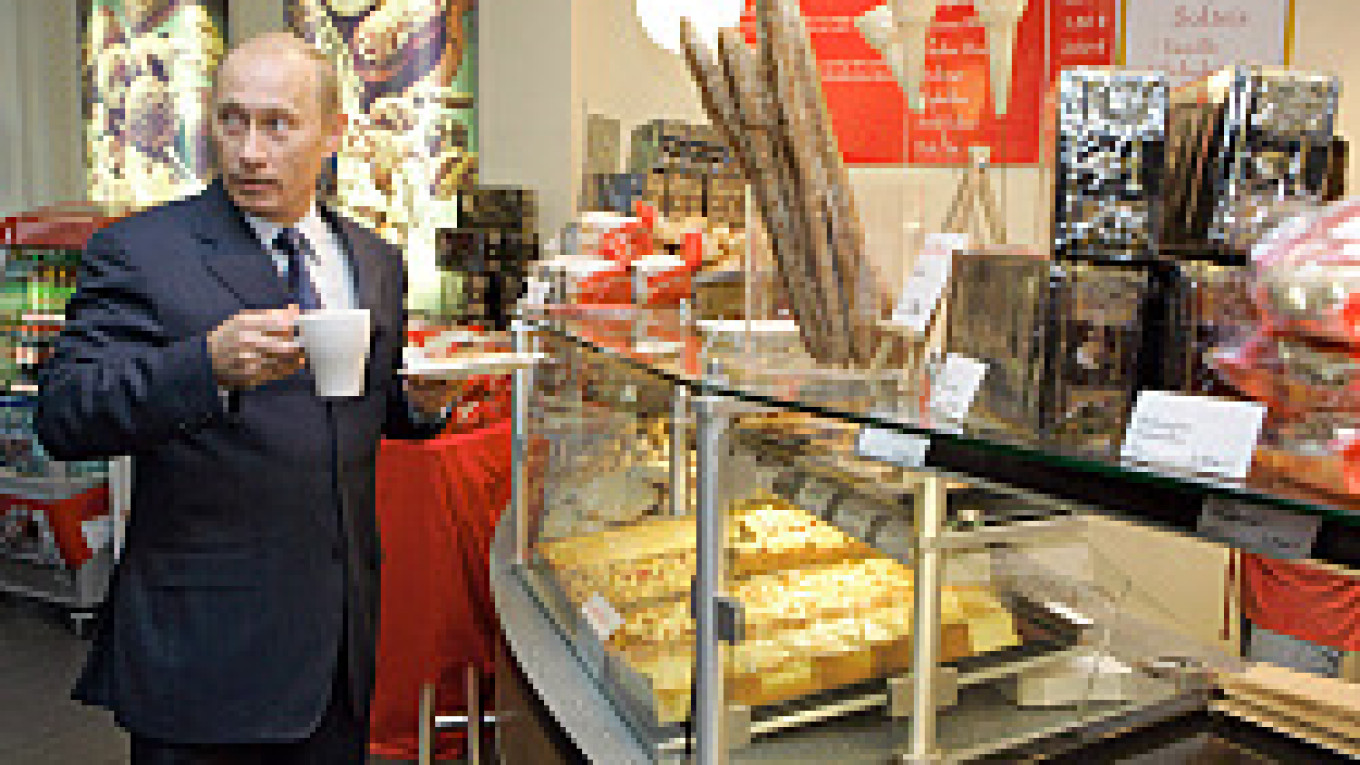Putin had hoped to further Russian business interests on a trip that took him first to the eastern city of Dresden to meet German Chancellor Angela Merkel on Tuesday, and to Munich on Wednesday, but he came at a time of deep suspicions in Europe over Russia's intentions.
Bavarian state premier Edmund Stoiber said he had talked to Putin about EADS and told him there were limits to foreign investments in sensitive sectors.
"I asked him to understand that in some strategic industries there are limits to taking reciprocal stakes," Stoiber said. "We must both respect each other's interests."
Germany worries that Moscow is trying to use revenues from its vast oil and gas reserves to wield greater global influence.
Stoiber's comments were a clear warning to Putin -- who makes no secret of his wish to invest further in Germany -- that he should steer clear of seeking a strategic investment in EADS after a Russian bank bought 5 percent of it.
But Putin hit back in a speech to business leaders in the Bavarian capital.
"We do not understand the nervousness in the press about Russia investing abroad," he said. "Where does this hysteria come from?"
"The Russians are coming here, not on tanks and with Kalashnikov assault rifles in their hands; they are coming with money, and they deserve to be welcomed and helped in their work," Putin said.
"It's not the Red Army that wants to come to Germany," he said. "It's just the same capitalists as you."
Moscow has been pushing for a seat on the EADS board and Putin told the S?ddeutsche Zeitung newspaper on Wednesday that he favored Russia boosting its stake in the Airbus parent, which has dual headquarters in Munich and Paris.
Putin also pushed for visa-free travel between Russia and other European countries. "Our goal is an exchange without visas," he said. "After the fall of the Berlin wall, no new walls should be allowed to appear in Europe."
Putin was meeting business and regional leaders in Munich and noted Bavaria's strength in the high-tech sector.
"This is an especially important area of cooperation for us because one of the main jobs in the short term is for us to diversify the Russian economy," Putin told reporters.
Putin brought with him Economic Development and Trade Minister German Gref and IT and Communications Minister Leonid Reiman, as well as leading business figures such as Pyotr Aven, head of Alfa Bank; Oleg Deripaska of Russian Aluminum; and Alexei Mordashov, head of steelmaker Severstal.
A range of corporate deals has been signed during the visit, and both the president and Stoiber stressed the potential for closer cooperation in future.
Siemens, Europe's largest engineering company, on Wednesday announced an agreement worth up to 450 million euros ($565 million) with Renova to upgrade Russian energy, transport and telecommunications resources.
The agreement covers areas including power generation, power distribution, telecommunications and airport modernization, Munich-based Siemens said in an e-mailed statement.
Putin has made much of Germany's reliance on Russia for its future energy needs during his visit. Memories here are still fresh of the supply disruptions in January after Gazprom cut deliveries to Ukraine.
Germany is the biggest foreign end-user of Russian gas, importing 40 billion cubic meters per year. Imports will rise substantially when the Nord Stream pipeline is completed in 2010 to carry Russian gas directly to Germany under the Baltic Sea. Gazprom is building the pipeline with German utility E.On and chemicals group BASF. Dutch Gasunie is to take a 9 percent stake, and Putin said Germany could become a gas distribution hub for Europe.
The Bavaria talks come on the heels of Putin's announcement in Dresden on Tuesday that Gazprom would use natural gas from the Shtokman field under the Barents Sea to more than double the amount of gas it sends to Germany each year, adding some 55 billion cubic meters per year.
Also on Tuesday, German Deputy Foreign Minister Gernot Erler said his government had drawn up plans to help German and Russian companies swap stakes in an attempt to foster political stability in Russia and mutual profit.
The German Foreign Ministry "is considering a program of intertwined companies," Erler said. "We hope to develop a win-win situation based on mutual dependency."
Questions about Saturday's killing of Politkovskaya did not abate during the trip.
Stoiber said he had discussed the issues of freedom of speech and expression in light of the killing, and that Putin had assured him Russia would strengthen those freedoms.
(Reuters, AP, Bloomberg, MT)
A Message from The Moscow Times:
Dear readers,
We are facing unprecedented challenges. Russia's Prosecutor General's Office has designated The Moscow Times as an "undesirable" organization, criminalizing our work and putting our staff at risk of prosecution. This follows our earlier unjust labeling as a "foreign agent."
These actions are direct attempts to silence independent journalism in Russia. The authorities claim our work "discredits the decisions of the Russian leadership." We see things differently: we strive to provide accurate, unbiased reporting on Russia.
We, the journalists of The Moscow Times, refuse to be silenced. But to continue our work, we need your help.
Your support, no matter how small, makes a world of difference. If you can, please support us monthly starting from just $2. It's quick to set up, and every contribution makes a significant impact.
By supporting The Moscow Times, you're defending open, independent journalism in the face of repression. Thank you for standing with us.
Remind me later.


